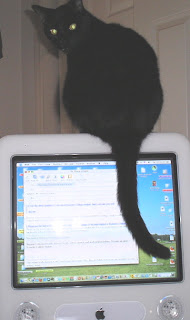Crit(ter) Group
My winning "Back Page" essay was printed in The Virginia Writer that came Saturday. At the next Virginia Writers Club regional meeting, I'll get a check for $40. I won't have to make an acceptance speech, but if I did, I'd had to thank an assortment of animals. I couldn't have written the winning essay without them.
Crit Group
Many writers rely upon “crit” groups to critique their work. While these writers write alone, they often take their works-in-progress to groups for helpful feedback. I, however, have a “critter” group which congregates on my desk. For me, writing is not a solitary occupation.When I write, I usually have a least one cat on my desk—sometimes as many as four. Often a border collie either sleeps under the desk or implores me to throw her ball while I type. Rather than distracting me, my critters actually help me write.
Buford, the senior male cat, taught me to focus on what’s necessary. Because he’s deaf, Buford needs to pay attention to detail. He notices slight movements, vibrations, changes in light and shadow. I notice slight nuances in word choices, how a sentence sounds, and changes in meaning.
Buford hates a cluttered desk—one swipe of his paw clears a place for him to nap and helps me decide what clutter I need to discard. Buford fantasizes that he’s still a tomcat, so—when we take a break to walk outside—he has to check his territory and re-mark where neighborhood cats have left their marks. He’s taught me to check and recheck, edit where necessary, and aspire to leave my mark on the literary world. And sometimes I fantasize too. What if—?
Eddie-puss, the youngest cat, sometimes challenges Buford for sleeping space on my desk, so I get a close-up view of a catfight in progress: two conflicting viewpoints. I watch as tension escalates. Does the scene on my computer screen have as much tension as the two opposing cats? Should I rewrite it from the antagonist’s viewpoint, or stick with the protagonist’s perspective?
Do I let the catfight play itself out, or do I intervene? I know the backstory: Buford has seniority and gets sympathy points for his handicap, but Eddie-puss has a heart murmur. According to the vet, one day I’ll find Eddie-puss dead—it’ll be quick and relatively painless. Knowing his condition makes me seize the day, gives me a “do-it-now” approach to my writing. Should I reveal a character’s flaw early, or spring it on the reader later? Is this flaw essential to the conflict? Should I give the story a quick, unexpected resolution?
 Camilla is all for fun. A miniature crouching tiger, she plays with an intensity the other cats lack. She pounces on a pen, bats it across the room, and searches for more. She paws through my stack of papers and scatters them about, or sits on my printer and watches letters appear on the computer screen. Then she snuggles onto my lap and purrs her best I-didn’t-make-all-that-mess-I’m-too-sweet purr. I look over what I’ve written. Do I increase the intensity here, slow it there, give the reader pause to think? Maybe add an ironic twist or have the character act in an unexpected way?
Camilla is all for fun. A miniature crouching tiger, she plays with an intensity the other cats lack. She pounces on a pen, bats it across the room, and searches for more. She paws through my stack of papers and scatters them about, or sits on my printer and watches letters appear on the computer screen. Then she snuggles onto my lap and purrs her best I-didn’t-make-all-that-mess-I’m-too-sweet purr. I look over what I’ve written. Do I increase the intensity here, slow it there, give the reader pause to think? Maybe add an ironic twist or have the character act in an unexpected way? Dylan, the smallest cat, likes to perch on my eMac. When he drapes his tail over the screen, I can’t see all of what I’ve written. Do I really need all those details to see the whole story? What can I cut? Will my readers see what I’m trying to say?
Dylan, the smallest cat, likes to perch on my eMac. When he drapes his tail over the screen, I can’t see all of what I’ve written. Do I really need all those details to see the whole story? What can I cut? Will my readers see what I’m trying to say?If the action on my desk become too intense, the sleeping border collie awakes and disperses the cat herd. She then stares at me with the intense border collie stare that says, “OK, you need a break. Let’s go outside. You throw the ball. I’ll chase it.”
And she’s right: I do need a break. The routine of mindless ball-throwing starts me thinking about other what-ifs. What if I throw a little to the left—or higher. How will that change how she catches the ball? What if I have a character do something unexpected? How will the character change? After a half-hour of many variations of throw-fetch-throw-fetch, I’m ready to work again.

Back inside, the border collie returns to her place under the desk and dozes off. Cats return to the desktop. I sit at my desk and focus on my work-in-progress.
Surrounded by my critter group, I write.


2 Comments:
Congrats on the win. I too have an audience of one cat. My friends and family would have to be the audience I have for telling funny happenings before writing them down. There I get a real laugh or silence to decide what works in my stories and what doesn't. I will have to test my cat for the untapped ability to listen and give honest opinion. I am glad to see it works. Have a good week!
Congratulations! And the Critter Group is an excellent committee!
Post a Comment
<< Home